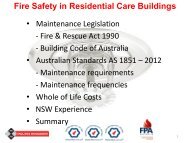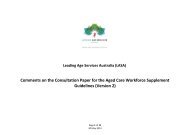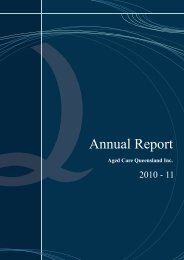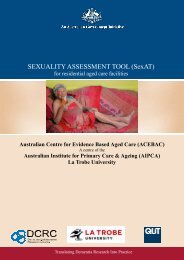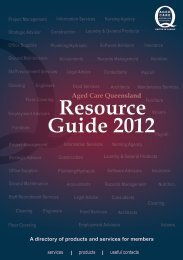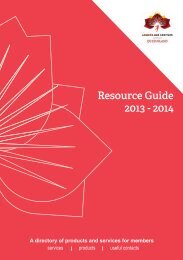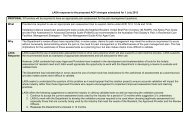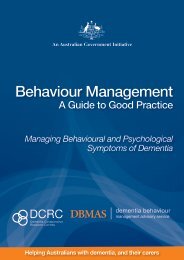ContentsSECTION NAME3 From the CEO5 From the President8 Retirement Living Feature: Asbestos in Retirementin Village Units - Workplace Health & Safety Obligations11 Retirement Living Update: Annual Annual Budgets Budgets14 Research: Sensor technology to to manage continence16 Community Care Conference -- back to to stay18 Living Longer, Living , Better and and the the <strong>Age</strong>d CareWorkforce Supplement: Hopes Dashed?20 Technology: Weighing up the Cost of of GoodManagement22 RAC providers drive efficiencies to to sustain sector24 Enhancing Data in in <strong>Age</strong>d <strong>Age</strong>d Care Care26 Depression and dementiatia28 High Achiever: EBITDA per per bed bed ‘nearly doubled’32 Navigating the muddy waters of of an insurance claim34 Advertorial: Staff <strong>Australia</strong> Healthcare36 Members News: The Village at at Yeronga Community38 Members News: Seasons Waterfront West Communityhelping community40 <strong>Age</strong>d Care eCase® Next Generation Software42 Research: Using resistance training to to reduce later lifedisability44 Fire and Maintenance Hand in in Hand48 <strong>LASA</strong> Q State Conference 2013: A conference A conference unites unitesan industryAdvertisers4 Executive Care Group/Care <strong>Age</strong>ncy <strong>Age</strong>ncy <strong>Services</strong> <strong>Services</strong>6 Fulton Trotter Architects7 Hynes Legal10 McCullough Robertson13 National Energy Solutions19 Miles Witt Partnership21 eziTracker29 IT IT Integrity30 BDO31 <strong>Australia</strong>n Reliance35 Staff <strong>Australia</strong>’s Healthcare41 Healthmetrics45 TT Buidling Surveyors46 QIP/IRCAS51 BentleysBack Cover 3 Million ReasonsOn the coverResidents observing the miniaturemodel of new building openedby The Village at Yeronga, nowhome to 36 happy new residents.Comments<strong>Leading</strong> <strong>Age</strong> <strong>Services</strong> <strong>Australia</strong> Queenslandencourages you to share your views. As amember, we invite you to contribute yourviews on topics currently affecting yourCommentsorganisation and/or the aged care industry asa whole.<strong>Leading</strong> <strong>Age</strong> <strong>Services</strong> <strong>Australia</strong>Queensland <strong>LASA</strong> Q <strong>Focus</strong> encourages is your forum you for sharing toshare your experiences, your views. ideas As a and member, views with we otherinvite members, you keeping to contribute up to date your with views currenton trends topics and currently enhancing affecting networks your within theorganisation industry. and/or the aged careindustry Please include as a whole. the writer’s name, addressand contact telephone number with all<strong>LASA</strong> Q <strong>Focus</strong> is your forum forcontributions.sharing your experiences, ideas andviewsAny photographswith otherrelevantmembers,to thekeepingarticle andupof thetowriterdate withare alsocurrentencouraged.trends andIf sendingenhancingarticles electronically,networkspleasewithinusetheWord forarticles,industry.jpeg or tif formats for photographsand eps for logos.Please include the writer’s name,address How to and reach contact us... telephonenumber with all contributions.Hugo SilvaAny photographs relevant to the<strong>LASA</strong> Q <strong>Focus</strong>, Editorarticle and of the writer are alsoPO Box 995, Indooroopilly Qld 4068encouraged. If sending articleselectronically,Tel 07 3725 5555pleaseFax 07use3715Word8166for E info@qld.lasa.asn.auarticles, jpeg or tif formats forphotographs and eps for logos.DISCLAIMERHow to reach us...<strong>LASA</strong> Q <strong>Focus</strong> <strong>Magazine</strong> is produced by <strong>Leading</strong> <strong>Age</strong> <strong>Services</strong><strong>Australia</strong>-Queensland for the information of its members.Contributions are welcomed from any organisation or individual,however, the Association, through its Editor, reserves the right toedit all submissions. Whilst the Editor endeavours to ensure that allinformation is correct, the Association does not take responsibility forincorrect information. The views expressed in this magazine are theauthors own and do not necessarily reflect those of the Association orHugo Silva<strong>LASA</strong> Q <strong>Focus</strong>, EditorPO Box 995, Indooroopilly Qld 4068Telthe Editor.07 3725All correspondence5555 Faxshould07be3715directed8166to:E info@qld.lasa.asn.auThe Editor, PO Box 995, Indooroopilly Qld 4068Telephone: (07) 3725 5555 Facsimile: (07) 3715 8166Email: info@qld.lasa.asn.auDISCLAIMERCopyright <strong>Leading</strong> <strong>Age</strong> <strong>Services</strong> <strong>Australia</strong> Queensland<strong>LASA</strong> Q <strong>Focus</strong> <strong>Magazine</strong> is produced by <strong>Leading</strong> <strong>Age</strong><strong>Services</strong> <strong>Australia</strong>-Queensland LEADING AGE SERVICES for the information AUSTRALIA ofits members. Contributions 2013 QUEENSLANDare welcomed PRINCIPAL from anyorganisation or individual, however, the Association,2013 PRINCIPAL SPONSORS SPONSORSthrough its Editor, reserves the right to edit allsubmissions. Whilst Diamond the Editor endeavours Sponsor to ensurethat all information is correct, the Association doesnot take responsibility for incorrect information. Theviews expressed in this magazine are the authors ownand do not necessarily reflect those of the Associationor the Editor. All correspondence Platinum Sponsorsshould be directedto:The Editor, PO Box 995, Indooroopilly Qld 4068Telephone: (07) 3725 5555 Facsimile: (07) 3715 8166Silver SponsorEmail: info@qld.lasa.asn.auAccountantsCopyright <strong>Leading</strong> <strong>Age</strong> <strong>Services</strong> <strong>Australia</strong> QueenslandAuditorsAdvisorsRuby Sponsor2<strong>LASA</strong>-Q <strong>Focus</strong> | Autumn edition 2013
SECTION EDITORIAL NAMEFrom the CEO...On a topic which may appear far removed from age services policyhere in <strong>Australia</strong>, an ABC Radio National program recently examineda suggestion made by Professor David Hemenway from the HarvardPublic School of Health, that much can be learned from past publicsafety successes to curb the increasing incidents of gun violence inthe United States (US).Barry AshcroftCEO<strong>Leading</strong> <strong>Age</strong> <strong>Services</strong> <strong>Australia</strong>QueenslandE: barry.ashcroft@qld.lasa.asn.auGood public policy…it’s out there!What makes this topic particularlyrelevant to the current ageservices policy environment is thatincreasingly our industry faceswhat seems like insurmountableand unrelenting poor governmentpolicy decision making, resultingin long-term, systemic, detrimentaloutcomes across the sector.Hemenway’s concerns are that inthe US ‘a child is 13 times morelikely to be murdered with a gunthan an average child in otherdeveloped countries’. He thinksthat a solution may lie in how roadpolicy has developed in the US inrecent decades.The Professor noted that in the1950’s ‘we were always told thereason we have so many roaddeaths was because of drivers;drivers were behaving stupidly,aggressively and illegally…so verymuch like the gun lobby today(‘guns don’t kill people …’)…andthat is what the car manufactures ineffect were saying (too)’.He went on to illustrate howeverthat through asking the moreappropriate question around whatwas causing the increase in roaddeaths and injuries, and not whowas to blame, the problem couldreally begin to be addressed.By highlighting that automobiledeaths and/or injuries werebeing sustained as a result ofthe physical environment; glass,steering columns, trees andlampposts, government was able tolegislate and regulate automobilesafety standards, encouragingmanufacturers and designers tomodify their cars and infrastructurefor optimal safety outcomes.These new standards also createda new and highly competitivemarket for the automobile/transportindustries, inspiring contestand innovation in safety designstandards and applications thatcontinue to be a key consumerconsideration today.In addition, public awarenesscampaigns focusing on driveractivities, such as drink driving,fatigue and not wearing seatbelts,resulted in a behavioural changethat now sees the social tolerance ofthese activities greatly reduced.So what is it that we, the ageservices industry, can take awayfrom the policy synergies drawn byProfessor Hemenway?More often these days we arefaced with poor age services policydecision making that breaks allof the good policy making rules;poor issue identification – notclearly articulating the problem tobe solved, negligible consultation– asking the wrong questions ofthe wrong people, lack of detailaffecting implementation oflegislation/regulation…and the listgoes on.Reflecting on Hemenway’s thesis, itoccurs to me that we need to lookto the instances of good publicpolicy of the past (Superannuation,Medicare, Road Safety etc.), andwhat made them successful, or atleast more successful than aged carereform.Armed with these lessons, we mustcontinue to force government toadhere to the principles of the‘policy cycle’, particularly the clearidentification and articulationof the problem to be solved,followed closely by asking theright questions…of the right people(consultation, collaboration, andeffective engagement).We need to be leaders in our ownsector by encouraging providersand suppliers to actively pursueinnovation that enables betterservice provision and promotes ahealthy, competitive and sustainableindustry going forward.And importantly, we must alsoacknowledge that obstacles,hazards, and dead-ends willbe inevitable in the pursuit ofgood policy development andimplementation, but that this shouldnot dissuade us.Learning the lessons (good, bador otherwise) from the successesof the past may just reinvigorate,stimulate, or provide alternativesto achieving policies that benefitcommunities, governments andindustries alike.Barry AshcroftCEO <strong>LASA</strong> Q<strong>LASA</strong>-Q <strong>Focus</strong> | Autumn edition 2013 3



